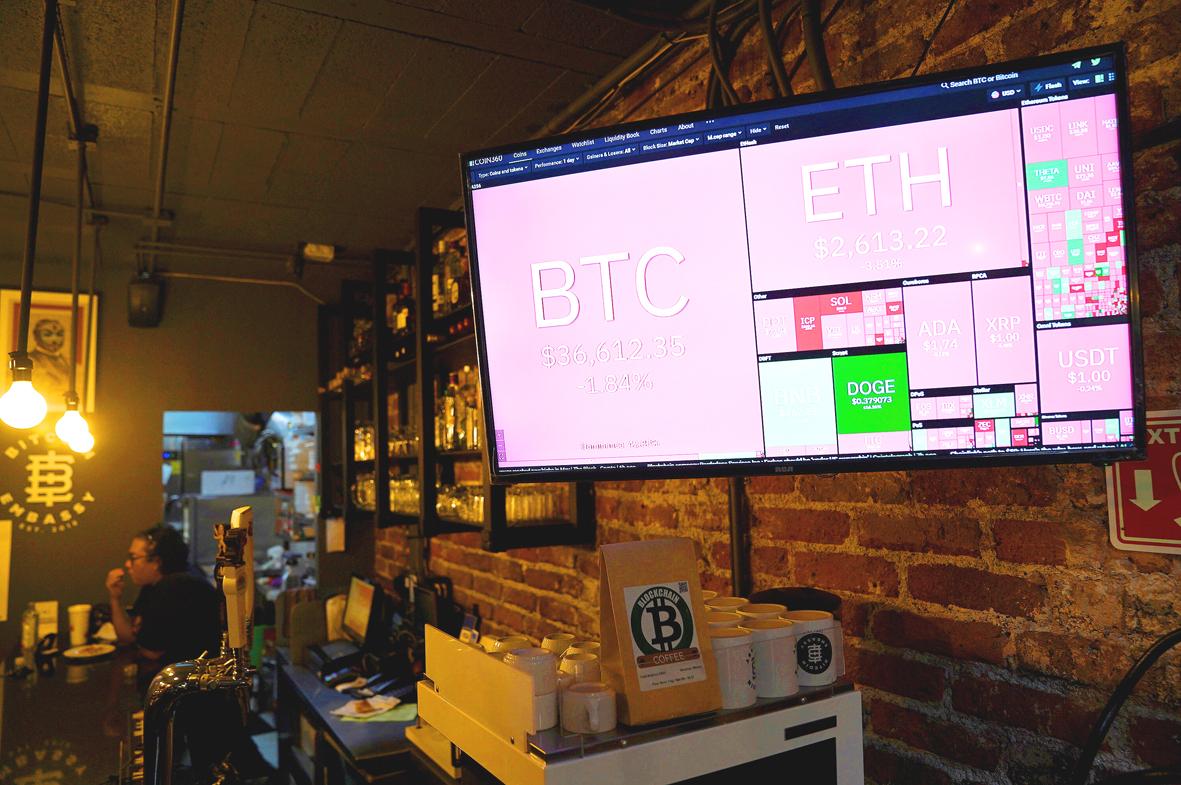Financial payments start-up Square Inc was on Friday at work on a real-world wallet for safely pocketing cryptocurrency.
Square founder and CEO Jack Dorsey, who is also the top executive at Twitter Inc, last month on Twitter asked for feedback on the notion.
“This community’s response to our thread about this project has been awesome — encouraging, generous, collaborative and inspiring,” Jesse Dorogusker, a member of Square’s hardware team, wrote on Twitter on Thursday.

Photo: Reuters
“We have decided to build a hardware wallet and service to make bitcoin custody more mainstream,” he said.
Dorsey endorsed Dorogusker’s post, tweeting: “We’re doing it #bitcoin.”
Hardware wallets can be used to store digital currency offline, synchronizing with applications for transactions on the Internet as needed.
Another option for cryptocurrency owners is to use “virtual” wallets, essentially trusting third parties to keep money safe and using passwords to access funds.
Dorsey on Twitter said that bitcoin is a currency for the masses, and that it is important to have ways for people to hold it that do not involve entrusting it to outside parties.
“The exchange you used to buy your bitcoin probably attends to your security with good intent, but circumstances may reveal ‘custody’ actually means ‘IOU,’” Dorsey wrote on Twitter last month, referring to a shorthand for “I owe you.”
“Deciding to take custody, and security, of your bitcoin is complicated,” he added.
Dorsey envisioned a bitcoin wallet that makes it easy for people to use some of it for shopping, for example through smartphones, while protecting the rest of the cryptocurrency.
“We can imagine apps that work without Square and maybe also without permission from Apple and Google,” he said, referring to the makers of the world’s two most widely used smartphone operating systems.
Square would set up accounts on Twitter and software developer community Web site GitHub dedicated to the bitcoin wallet project, Dorsey said.
In related news, a 101.38 carat diamond was sold at Sotheby’s for HK$95.1 million (US$12.3 million) in cryptocurrency, becoming the most expensive piece of jewelry sold through such type of payment, the auction house said.
The pear-shaped diamond, named “The Key 10138,” was on Friday sold to an unidentified private collector, Sotheby’s said in a statement.
The gem from Diacore Co was the second-largest pear-shaped diamond ever to be sold publicly, it said.
Prior to the sale, the international auction house said it would take bitcoin or ether as payment for the diamond, which fetched less than the estimate of as much as US$15 million in the single-lot offering in Hong Kong.
The auction was livestreamed and attracted no more than a dozen bids.
Earlier last week, Sotheby’s said it was the most expensive physical object ever publicly offered for purchase with cryptocurrency.
Auction houses are increasingly accepting cryptocurrencies for payment, with Phillips last month offering a piece from street artist Banksy for ether or bitcoin.
Christie’s in March accepted payment in ether for the record US$69.3 million sale of Beeple’s Everydays: the First 5,000 Days.
Additional reporting by Bloomberg

Sweeping policy changes under US Secretary of Health and Human Services Robert F. Kennedy Jr are having a chilling effect on vaccine makers as anti-vaccine rhetoric has turned into concrete changes in inoculation schedules and recommendations, investors and executives said. The administration of US President Donald Trump has in the past year upended vaccine recommendations, with the country last month ending its longstanding guidance that all children receive inoculations against flu, hepatitis A and other diseases. The unprecedented changes have led to diminished vaccine usage, hurt the investment case for some biotechs, and created a drag that would likely dent revenues and

Macronix International Co (旺宏), the world’s biggest NOR flash memory supplier, yesterday said it would spend NT$22 billion (US$699.1 million) on capacity expansion this year to increase its production of mid-to-low-density memory chips as the world’s major memorychip suppliers are phasing out the market. The company said its planned capital expenditures are about 11 times higher than the NT$1.8 billion it spent on new facilities and equipment last year. A majority of this year’s outlay would be allocated to step up capacity of multi-level cell (MLC) NAND flash memory chips, which are used in embedded multimedia cards (eMMC), a managed

CULPRITS: Factors that affected the slip included falling global crude oil prices, wait-and-see consumer attitudes due to US tariffs and a different Lunar New Year holiday schedule Taiwan’s retail sales ended a nine-year growth streak last year, slipping 0.2 percent from a year earlier as uncertainty over US tariff policies affected demand for durable goods, data released on Friday by the Ministry of Economic Affairs showed. Last year’s retail sales totaled NT$4.84 trillion (US$153.27 billion), down about NT$9.5 billion, or 0.2 percent, from 2024. Despite the decline, the figure was still the second-highest annual sales total on record. Ministry statistics department deputy head Chen Yu-fang (陳玉芳) said sales of cars, motorcycles and related products, which accounted for 17.4 percent of total retail rales last year, fell NT$68.1 billion, or

In the wake of strong global demand for AI applications, Taiwan’s export-oriented economy accelerated with the composite index of economic indicators flashing the first “red” light in December for one year, indicating the economy is in booming mode, the National Development Council (NDC) said yesterday. Moreover, the index of leading indicators, which gauges the potential state of the economy over the next six months, also moved higher in December amid growing optimism over the outlook, the NDC said. In December, the index of economic indicators rose one point from a month earlier to 38, at the lower end of the “red” light.